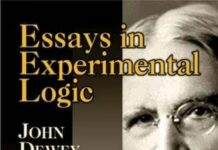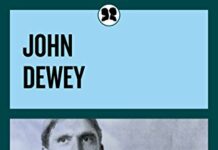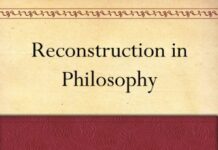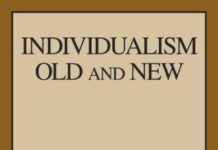
Ebook Info
- Published: 2008
- Number of pages: 844 pages
- Format: PDF
- File Size: 46.62 MB
- Authors: John Dewey
Description
This antiquarian volume contains a detailed treatise on logic and the theory of ‘Inquiry’, as a development of ideas regarding the nature of logical theory that were first presented in Studies in Logical Theory.The present work is marked in particular by application of the earlier ideas to interpretation of the forms and formal relations that constitute the standard material of the logical tradition.Inquiry is one of the most essential skills in the world of business and management; as well as being of great utility to the student of philosophy, this book can help clarify the process of inquiry and develop skills for inquiry in the context of decision making, and may therefore be of considerable service to a range of different readers. The chapters of this volume include: – The Matrix of Inquiry – The Problem of Logical Subject-Matter – Common Sense and Scientific Inquiry – The Needed Reform of Logic – Immediate Knowledge: Understanding and Inference This vintage book is being republished now in an affordable, modern edition complete with a new prefatory biography of the author.
User’s Reviews
Reviews from Amazon users which were colected at the time this book was published on the website:
⭐This review is of the Kindle edition. This is an important distinction to make, since an earlier reviewer evidently examined a *used* book, or a .PDF image of a used version. None of those previous criticism hold in this case. This is a full-blown kindle version, not an image of a book, so there are no marginalia from a previous used edition.That said, this is an excellent Kindle version of one of the most important contributions to the philosophy of logic in the past 100 years. It is important to note the distinction here between a “logic text,” which this is not, and an inquiry into the “meta-theory of logic,” or “the philosophy of logic,” which this most assuredly is. Dewey is *NOT* investigating questions such as, “How do I prove X from such and such a collection of premises?” Rather, he is asking things like, “What is logic?” “How does logic emerge from other activities?” “What licenses logic as a standard of rationality?” and so on.Dewey was notorious for his general disregard of — if not out right disdain for — the merely formal methods of his day, and the sop he tosses out in that direction in the form of Chapter XVII will not satisfy anyone looking for a treatise on symbolic techniques. (For anyone with such an interest, there are innumerable books to be had on the subject, many of them reasonably good, and even a few of these can be had for free as they exist as downloadable .PDF’s available under Creative Commons licenses.)Rather, this book should be viewed as an answer to the question why we should learn these formal methods in the first place. This is actually a pressing issue, not only for the undergrads shoe-horned into an intro class, but for the professors that teach those classes as well. From personal experience and anecdotal evidence (I know — real scientific … ) it seems very few philosophy professors can provide an especially satisfactory answer to that “why” question. But when we follow Dewey and look upon logic as the general theory of inquiry, then formal methods reveal themselves as those essential adjuncts that enable us to organize information, recognize hypotheses as eliminable, and ASK THE NEXT SET OF QUESTIONS that will enable us to test those hypotheses for possible elimination.This position has been largely neglected in contemporary philosophy circles, but not entirely forgotten. If one has access to a decent research library (or tons of money to spend) volume 5 of Jaakko Hintikka’s selected papers, “Inquiry as Inquiry” (available at Amazon) brings contemporary formal methods to bear in a manner that is very much of a piece philosophically with Dewey’s arguments. (It should be noted here that the model-theoretic methods that Hintikka favors did not exist at the time that Dewey’s “Logic” was published. So Dewey cannot be criticized for “failing” to bring matters forward in the fashion that Hintikka has done.) Hurley’s “Concise Introduction to Logic” emphasizes the connection between formal methods and general inquiry as well. One might also mention Cohen and Nagel’s “An Introduction To Logic And Scientific Method” in this regard. While the formal techniques are a bit out of date, the book is contemporary with Dewey’s own work.However, none of the above books do the legwork of Dewey’s “Logic” in terms of developing a fully coherent meta-theory of logic as inquiry. Such a meta-theory is absolutely essential for any appreciation of the formal techniques which are, after all, only an adjunct to the broader process of inquiry itself. Absent such a meta-theory, these adjunct instruments are difficult to appreciate as anything more than mathematical diversions of questionable practical use. With that meta-theory, they become essential components in the progress of inquiry.
⭐Along with Dewey’s (1916) Essays in Experiential Logic, Logic: The Theory of Inquiry is a text I often return to, especially as these works relate to my professional writing in the field of adult literacy education, to which I have sought to incorporate the corpus of Dewey’s work in inquiry, aesthetics, political culture, and of course, education. I can never exaggerate the richness of Logic 1938 and have read substantial portions of this magnificent text many times during the past 20 years. In fact, my thickly lined paper back version is now broken into three parts, loosely bonded together by masking tape. After working through the Kindle version of the entirety of Logic, which was a supremely valuable aesthetic experience in itself, I decided it was time now to get a fresh paper copy. How surprised I was to have obtained the books printed by demand beautifully designed and exquisitely bounded hard back version of the original 1938 text that I can only imagine I will be studying in-depth for many years f I should be so blessed to remain on this planet. One thing I can be sure of, I will wear out long before this book ever falls apart.
⭐I don’t plan to buy this edition of the Logic, because when I used “look inside this book” I found that the page images showed handwritten markings by an earlier reader. When I buy *used* books I insist that they be in “very good” condition, which means no page markings. I certainly don’t expect new and somewhat costly books to contain markings. I fear that with things like Googlebooks we will increasingly face this problem. Caveat Emptor!
⭐Brilliant. A must read for anyone calling themselves a thinker. Probably the most important book of our time, not just for philosophy students but for anyone concerned in general about the human predicament on our planet.
⭐Parfait !!
⭐
Keywords
Free Download Logic – The Theory of Inquiry in PDF format
Logic – The Theory of Inquiry PDF Free Download
Download Logic – The Theory of Inquiry 2008 PDF Free
Logic – The Theory of Inquiry 2008 PDF Free Download
Download Logic – The Theory of Inquiry PDF
Free Download Ebook Logic – The Theory of Inquiry



